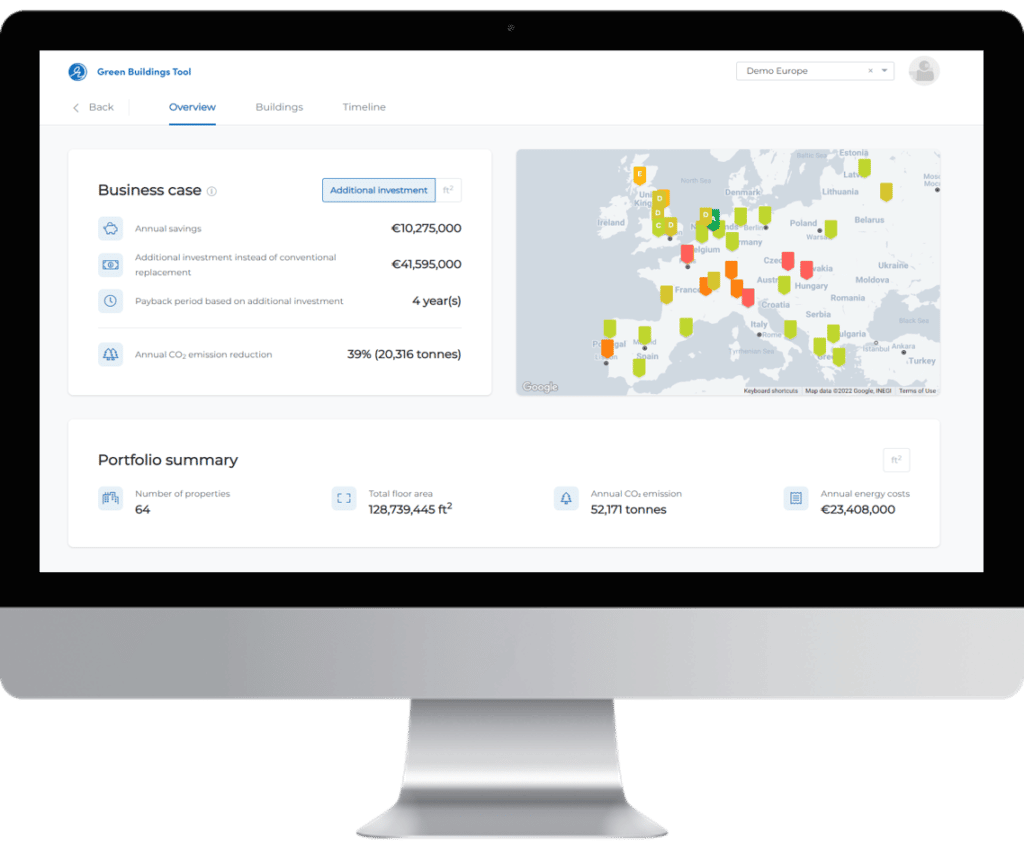

New features of the Green Buildings Tool in 2023 and a sneak peek into 2024
In 2023, the Green Buildings Tool has taken a leap forward in providing comprehensive and efficient sustainability solutions. The implementation of several new features not only enhances the usability of the tool but also reflects a commitment to staying at the forefront of environmental data management. Let’s delve into the highlighted features introduced in 2023 and catch a glimpse of what’s to come in 2024.
1. Green Buildings Tool API: streamlining sustainability integration
One of the notable upgrades that were implemented in 2023 is the improved Green Buildings Tool API, allowing for seamless integration of sustainability data into external systems. This enhancement empowers users to effortlessly incorporate the tool’s insights into their existing workflows, promoting a more interconnected and streamlined approach to sustainability management.
2. CRREM Module: a valuable perspective on carbon performance
The integration of CRREM pathways into the Green Buildings Tool is a logical step forward, as CRREM is based on total carbon emissions, which was already being calculated within the Green Buildings tool. This integration allows users to assess their properties against CRREM decarbonisation pathways, offering a valuable perspective on their current and future carbon performance.
3. Portfolio Analysis: on energy performance & carbon emissions
With the Portfolio Analysis you will be able to analyse large real estate portfolios based on their energy performance and carbon emissions. With the simple input of four data points – the address, property type, construction period, and floor area – the CFP Green Buildings algorithms provide useful data results that can be utilised for your specific needs. Portfolio analyses are frequently used to fulfil reporting requirements and conduct baseline assessments. Moreover, this tool can be utilised for green bonds, CRREM alignment, and risk assessments.
4. EPC ratings across Europe: a Pan-European perspective
Expanding its reach, the Green Buildings Tool now incorporates Energy Performance Certificates (EPC) for buildings in Belgium, Netherlands, UK, France, Italy, Germany, and more. This pan-European inclusion provides users with a comprehensive understanding of energy efficiency standards, fostering sustainability initiatives across borders.
5. MEES Compliancy: ensuring regulatory adherence across portfolios in the United Kingdom
A new addition to the tool, the Minimum Energy Efficiency Standards (MEES) Compliancy module, analyzes buildings, offering insights into their compliance status. By combining this feature with the EPC scenario tool, users gain valuable information on potential business cases to make their entire portfolio fully compliant.
6. NABERS ratings: precision in Australian energy performance
The introduction of a new energy performance rating for Australian buildings is a significant milestone. NABERS ratings contribute to a more precise evaluation of energy efficiency, aiding in the promotion of sustainable practices across the Australian real estate landscape.
7. Portfolio report and shareable building report: streamlining communication
Users can now generate PDF reports for entire portfolios, providing a consolidated view of sustainability metrics. Furthermore, the introduction of a shareable building report with a unique URL facilitates easy collaboration and communication on sustainability.
8. Confidence Indicator feature: precision in sustainability management
To enhance result accuracy, the Confidence Indicator feature highlights specific tasks per building, offering guidance to users and promoting a more reliable and valid interpretation of the tool’s results.
9. New language support: a global reach
The Green Buildings Tool now supports US-English, German, and French, in addition to Dutch and British English. This enhances accessibility, ensuring that users worldwide can seamlessly engage with the tool in their preferred language.
The Green Buildings Tool continues to evolve in 2024

As the Green Buildings Tool continues to evolve, these highlighted features underscore its commitment to providing a comprehensive, user-centric, and globally relevant platform for sustainable real estate management. Looking ahead to 2024, the Green Buildings Tool will continue to do so. That’s why we would like to give you a small insight into what’s on the horizon in 2024.
Extended data delivery: enriching analysis capabilities
The inclusion of new data fields such as building characteristics and climate data in data delivery services further enriches the tool’s capabilities, providing users with a more comprehensive and detailed dataset for analysis.
Green Buildings Tool suite
Aiming for a unified experience, the Green Buildings Tool is set to introduce a suite that allows users to seamlessly switch between CFP’s sustainable software applications, consolidating sustainability management on one platform.
Do you want to know how the Green Buildings Tool can assist you in achieving your sustainability goals? Read more about the Green Buildings Tool or get in touch for a demo.






